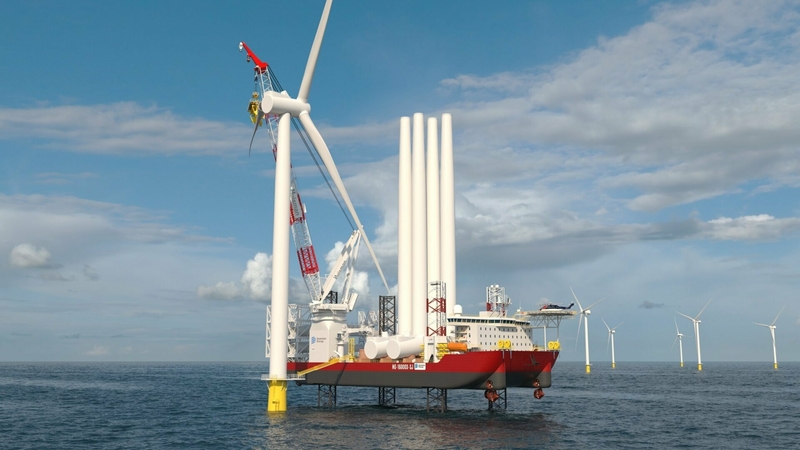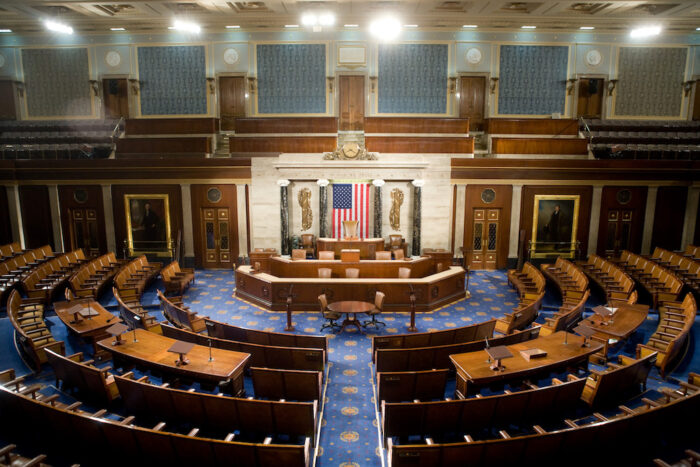Offshore wind bill inches forward in state Senate as Harris and GOP colleagues vow to attack it nationally

Wildwood, New Jersey and Ocean City, Maryland are 41 nautical miles apart. They have honky-tonk boardwalks, robust tourist economies, amusement parks, and very vocal opponents to proposed offshore wind energy developments off their respective coasts.
On Thursday afternoon, the Republican congressmen who represent these resort towns — along with two of their GOP colleagues — held a public hearing in New Jersey at the Wildwoods Convention Center, along the boardwalk, that surely will further whip up opposition to offshore wind.
The hearing took place an hour after the Maryland Senate inched closer to passing a bill designed to expand the fledgling offshore wind industry in the state. The measure won preliminary approval after Minority Leader Stephen S. Hershey Jr. (R-Upper Shore) peppered bill sponsor and floor leader, Sen. Katie Fry Hester (D-Howard), with multiple questions that touched on many themes raised later during the congressional hearing.
In both settings, the Republican argument against wind energy boiled down to this: The projects are expensive and burdensome while the economic benefits, if there are any, are impossible to calculate. The environmental risks of erecting giant towers in the ocean and bringing transmission lines onshore, are unknown, even if they are generating renewable energy. And the regulatory process is terribly flawed and unresponsive to community concerns.
“How do we know how this is getting paid for?” Hershey asked at one point — a query that was so broad it appeared to flummox Hester. Senate President Bill Ferguson (D-Baltimore City) quickly suggested putting off further debate on the bill for an hour.
Regardless of the merits of the Republican arguments, the federal government is pressing ahead with expansive plans to make offshore wind developments commonplace off both coasts and in the Gulf of Mexico.
In Maryland, two offshore wind developers, Ørsted and US Wind, wait for final federal approval to proceed with projects near Ocean City and have begun to assemble production and maintenance facilities and workforces across the region.
Hester’s Promoting Offshore Wind Energy Resources (POWER) Act, sponsored in the House by Del. Lorig Charkoudian (D-Montgomery), aims to ease expansion of the offshore wind industry in the state by:
- Strengthening labor standards for offshore wind manufacturing, installation, maintenance, and ensuring that much of the workforce is unionized;
- Setting a goal for the state to generate 8.5 gigawatts of offshore wind by 2031, enough to power about 1.3 million homes. Maryland currently is preparing to build 2 gigawatts of offshore wind power;
- Leasing roughly 1 additional gigawatt of offshore wind power in existing federal lease areas;
- Attempting to facilitate construction of shared transmission infrastructure that would bring energy generated by wind turbines onshore and connect it with the regional electric power grid.
Utility ratepayers are already contributing to offshore wind development in their monthly bills, but Hershey argued that provisions of the POWER Act will have to be covered by all taxpayers. Hester countered that any extra costs associated with the legislation would be recouped through new federal subsidies for clean energy.
“Potentially, no savings come back to the ratepayers as a result of federal subsidies going to the [wind energy] developers,” Hershey shot back.
Hester responded that the state needs more energy generation, according to the regional grid operator PJM, and that tailoring legislation to the federal Inflation Reduction Act is necessary to access federal funding for wind energy and other expansion.
“The money isn’t available unless the projects are being built,” she said. “There’s no benefit to ratepayers if the projects aren’t being built.”
Hershey introduced an amendment to the bill that would have required utilities to itemize the costs for offshore wind being passed down to consumers. He said sarcastically that in addition to being more transparent than the way the costs are accounted for on current utility bills, doing so would enable Marylanders “to recognize all the wonderful things we’re doing here in the General Assembly and also recognize the added costs” lawmakers have imposed on them.
Hester argued that the amendment was unnecessary because utility bills already list “distribution charges.”
The amendment was voted down, 16-30. Three Democrats joined all Republicans in voting for it: Sens. Mary-Dulany James (Harford), Ariana Kelly (Montgomery) and Ron Watson (Prince George’s). The bill was moved to a final vote that will come in the next couple of days.
The House version of the bill, meanwhile, has yet to be voted out of the Economic Matters Committee.
‘The fix was in’
Even though Hershey’s questions of Hester were pointed at times, debate over the wind bill in the Senate never lost any sense of decorum.
That wasn’t the case at the raucous congressional hearing in New Jersey on Thursday, billed “An Examination Into Offshore Wind Industrialization.” Hosted by Rep. Jeff Van Drew (R-N.J.), who represents the southern part of the Jersey Shore, the event brought Maryland Rep. Andy Harris (R-1st) and Reps. Chris Smith (R-N.J.) and Scott Perry (R-N.J.) to Wildwood.
The hearing featured dramatic testimony from the head of Clean Ocean Action, who has warned that wind turbines could have disastrous consequences for marine life; two seafood industry business owners who asserted that their livelihoods are threatened by the federal government’s support of offshore wind; a retired judge who has represented New Jersey’s Cape May County in its legal and political attempts to halt offshore wind development; a retired U.S. energy regulator who is actively opposing offshore wind development; and an economist with a conservative think tank in Delaware that has flown airplane banners over Ocean City opposing offshore wind.
The officials and witnesses gave dire warnings about the consequences of offshore wind — and blasted the Biden administration for promoting it.
Van Drew warned that if “offshore wind industrialization is allowed to move forward it will be the most profound transformation of the Atlantic coast in the history of the United States of America.”
Harris, a longtime critic of offshore wind energy, said that as the federal Bureau of Ocean Energy Management (BOEM) promotes offshore wind and begins to approve projects off the Atlantic coast, he has become convinced “the fix was in. That’s the bottom line. That’s all this testimony was.”
The Maryland lawmaker, who serves on the House Appropriations Committee, noted that as an appropriator, he has a say over federal agency budgets, and threatened to withhold salaries for BOEM, an agency within the U.S. Department of the Interior.
“We’re going to deal with them in this year’s appropriations bill, let me tell you,” Harris said.
And the conservative lawmakers often sounded like liberals, worrying over the environment and the health of whales, accusing the Biden administration of favoring powerful foreign interests over the needs of everyday Americans, and invoking some rhetoric of the left.
“This is what democracy looks like,” Harris said, looking out approvingly at the hundreds of wind energy opponents in the convention center auditorium.
The lawmakers complained that some foreign-owned companies, like Ørsted, are going to profit from drawing energy from U.S. waters. And they railed against state legislators who are embracing offshore wind.
“We have state authorities regulating foreign entities looking to build more power plants in federal waters,” Perry said.
“Is this America? Is this the America we know and love?” Van Drew fumed. “I think it’s wrong. I think it’s unconstitutional.”
The New Jersey congressman said he hoped to schedule another hearing on offshore wind on Capitol Hill soon.




 Creative Commons Attribution
Creative Commons Attribution